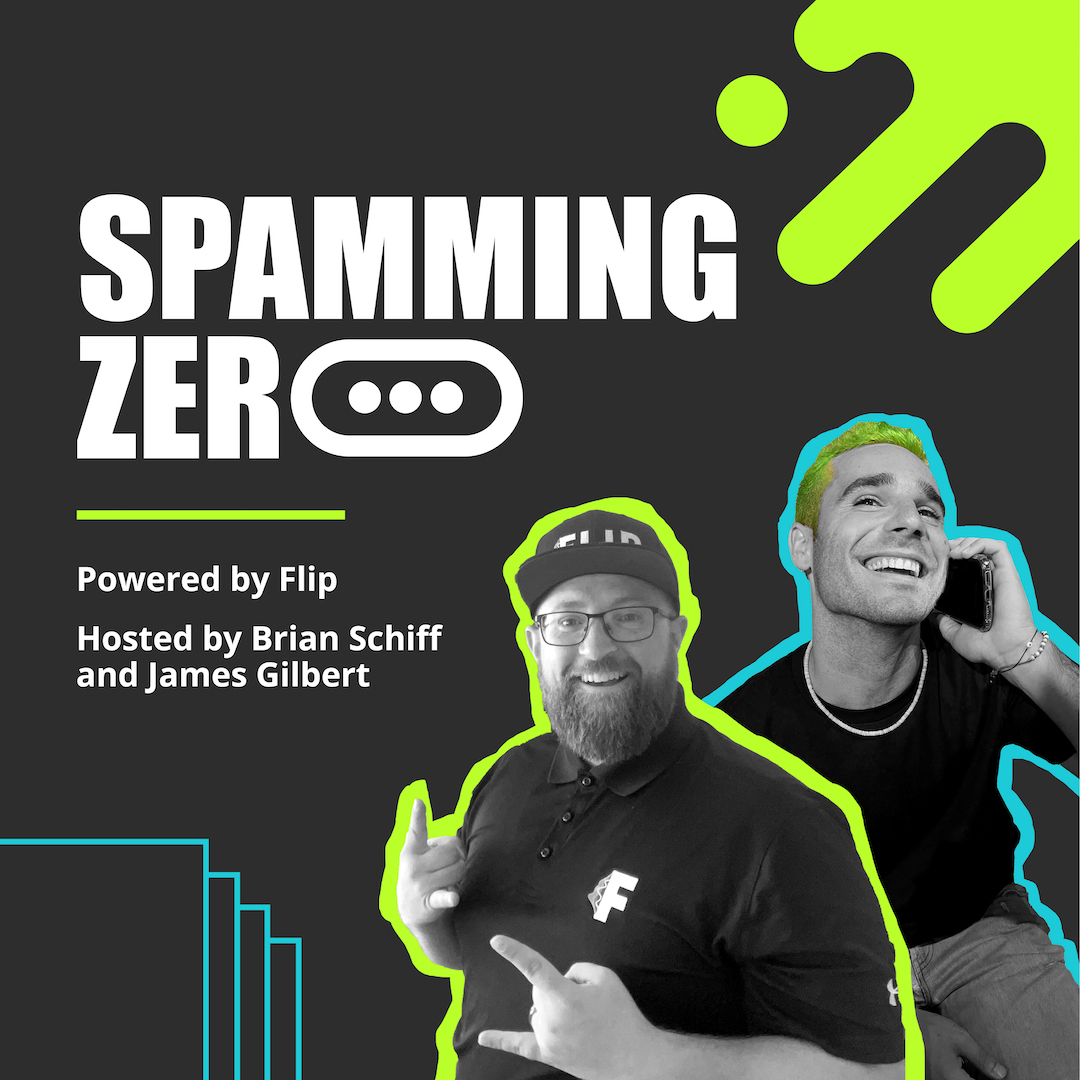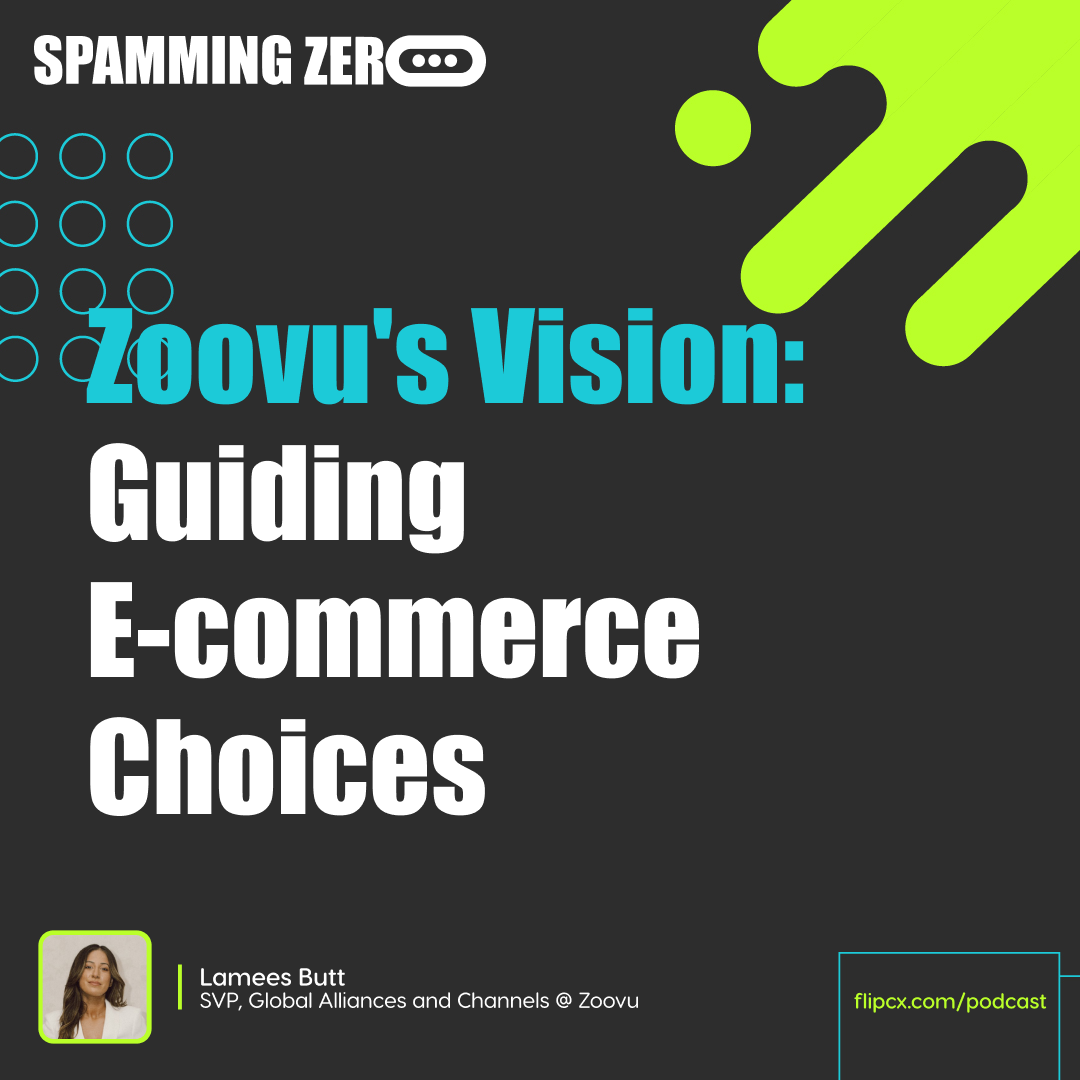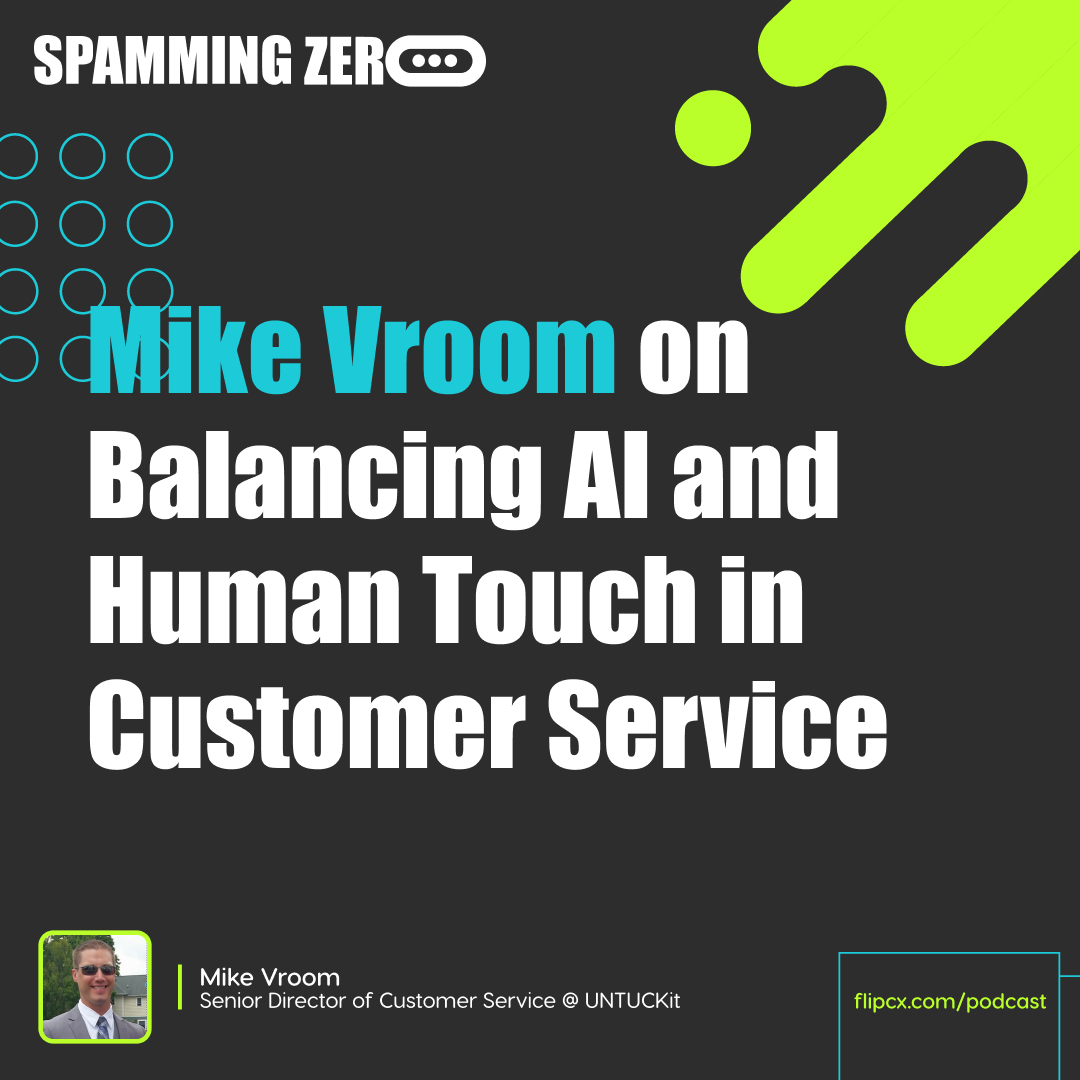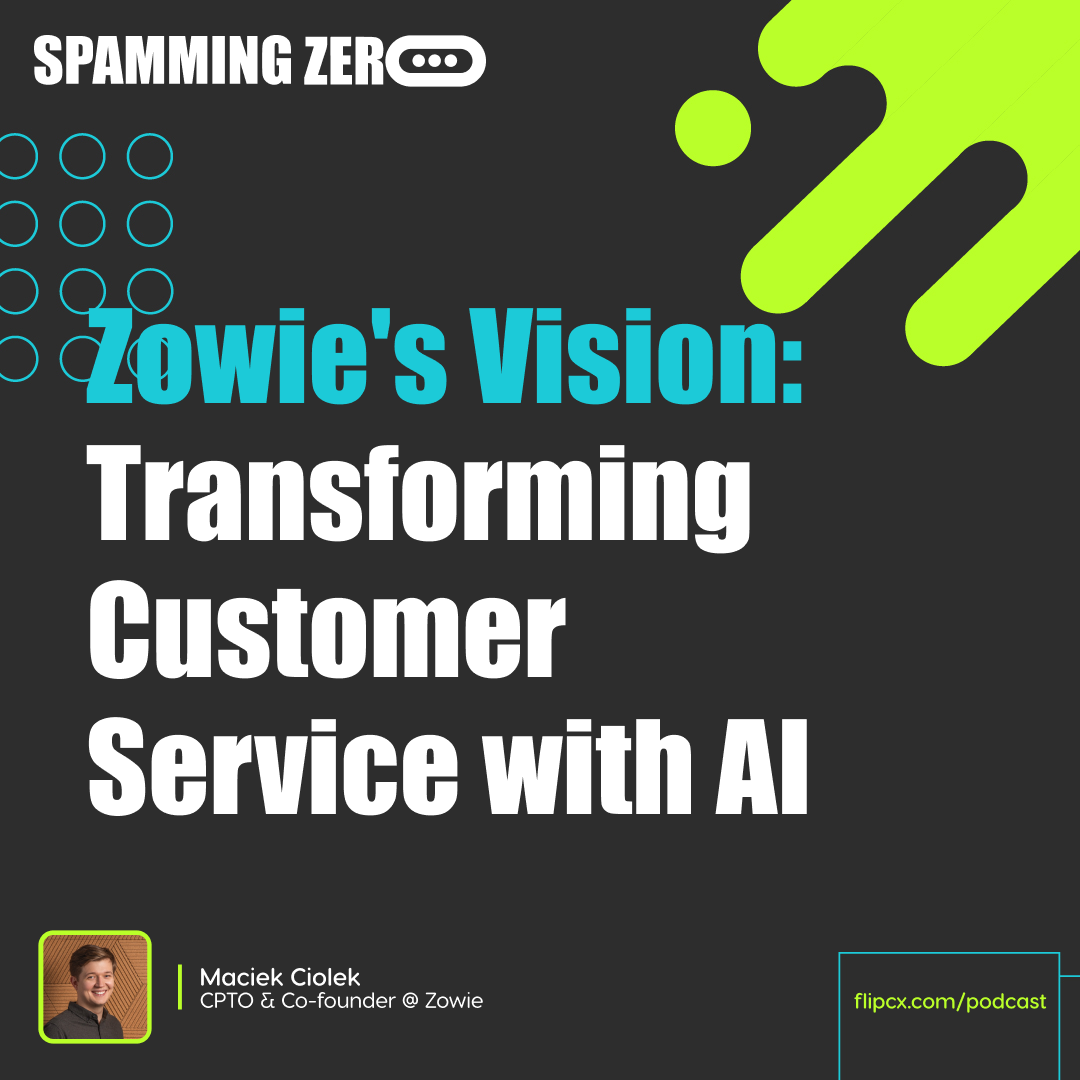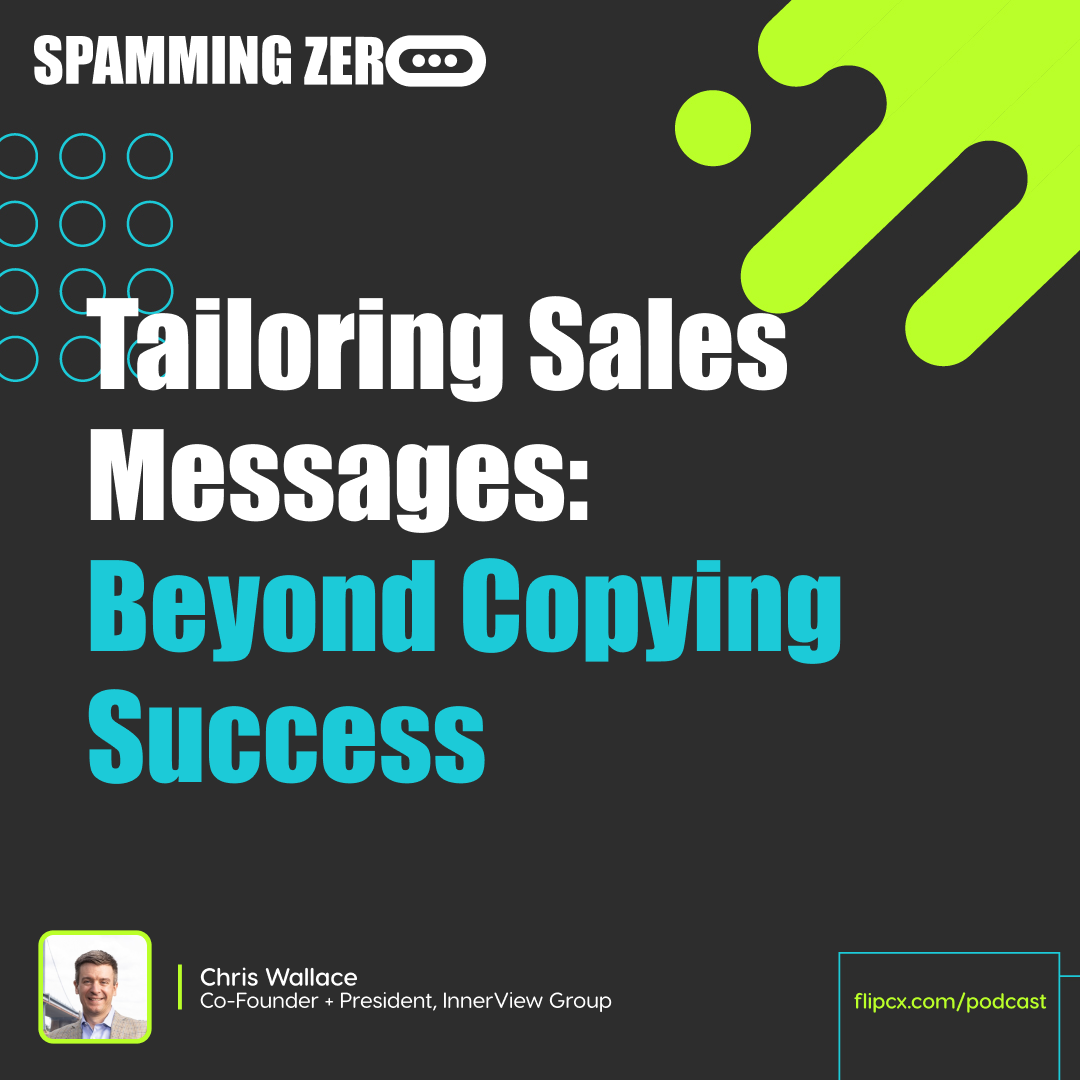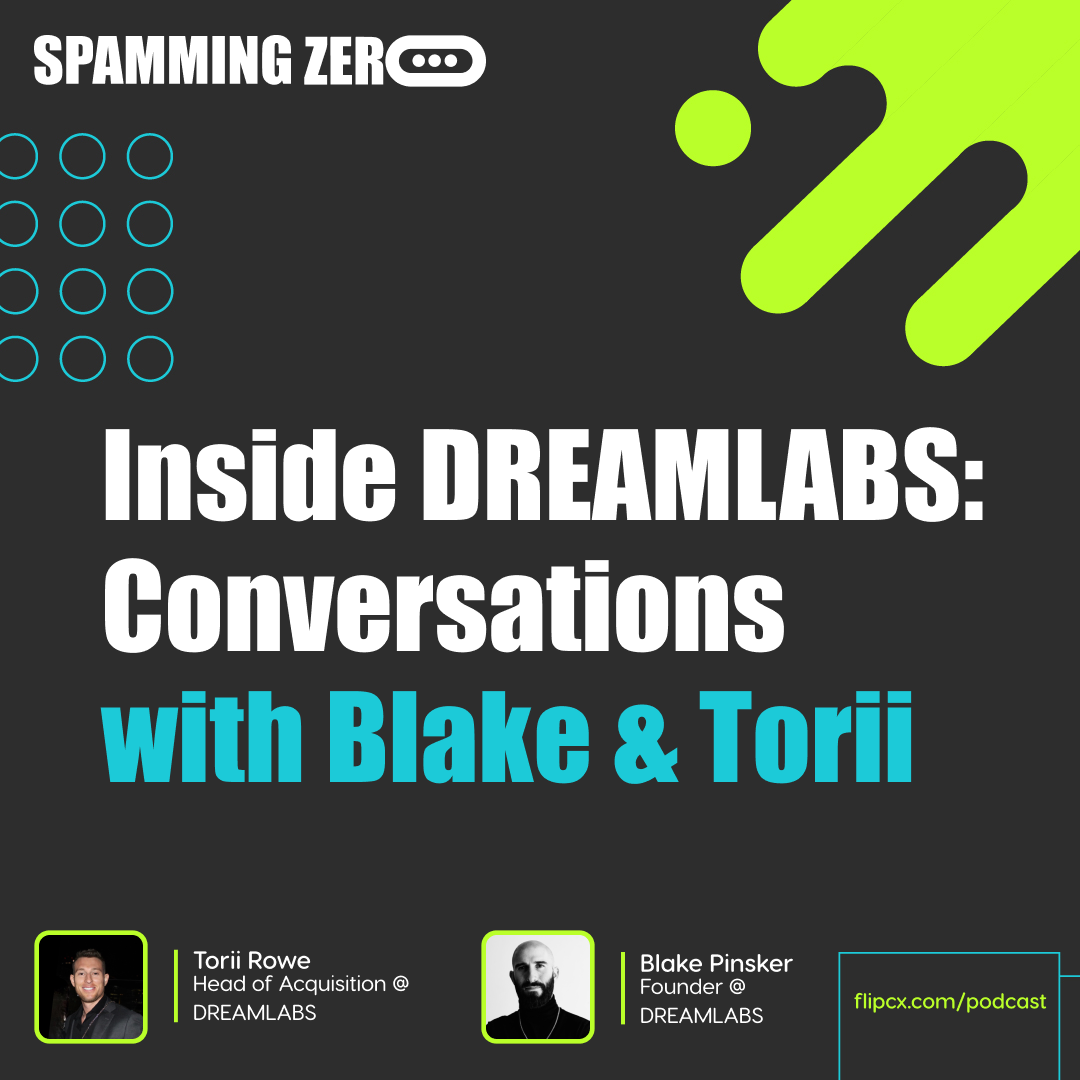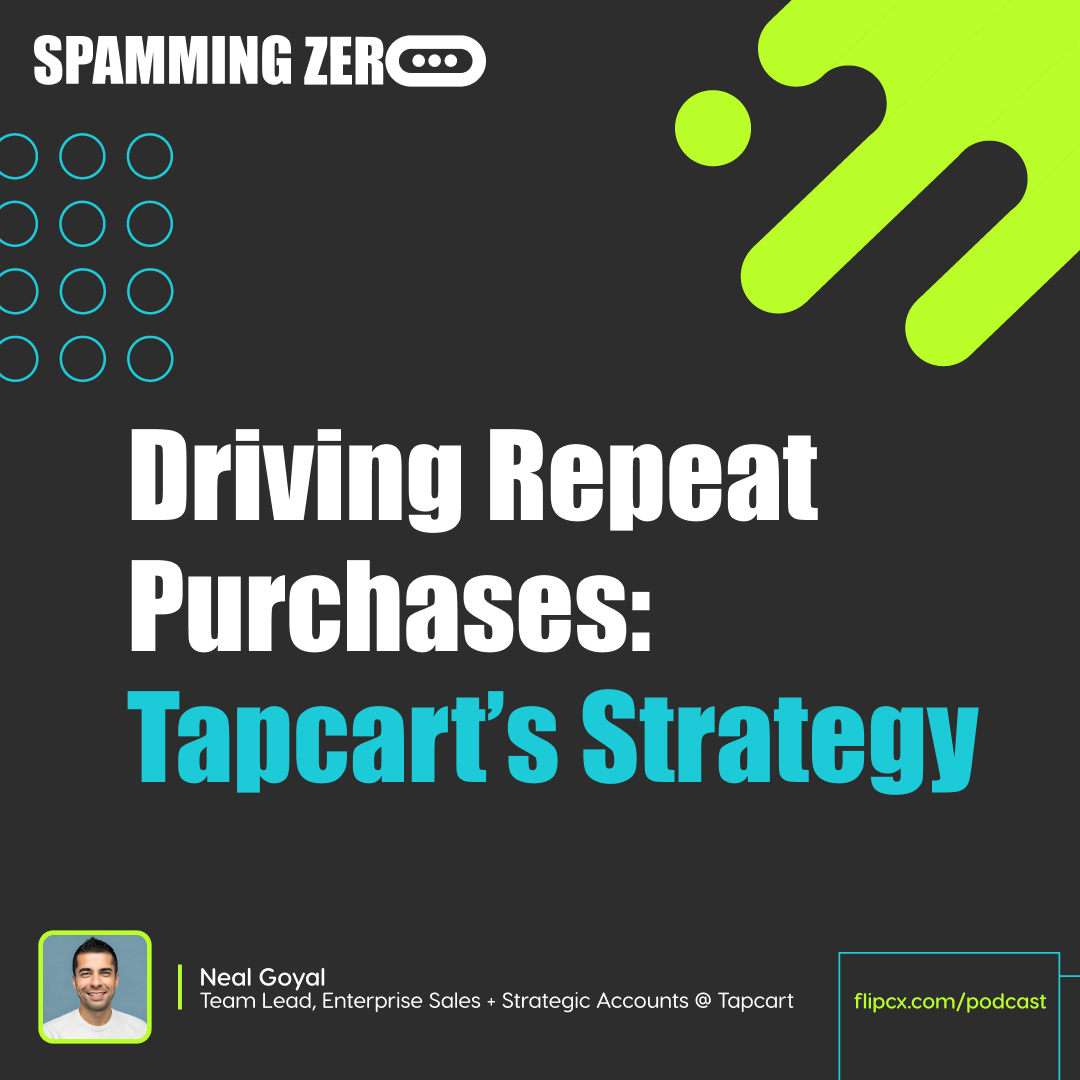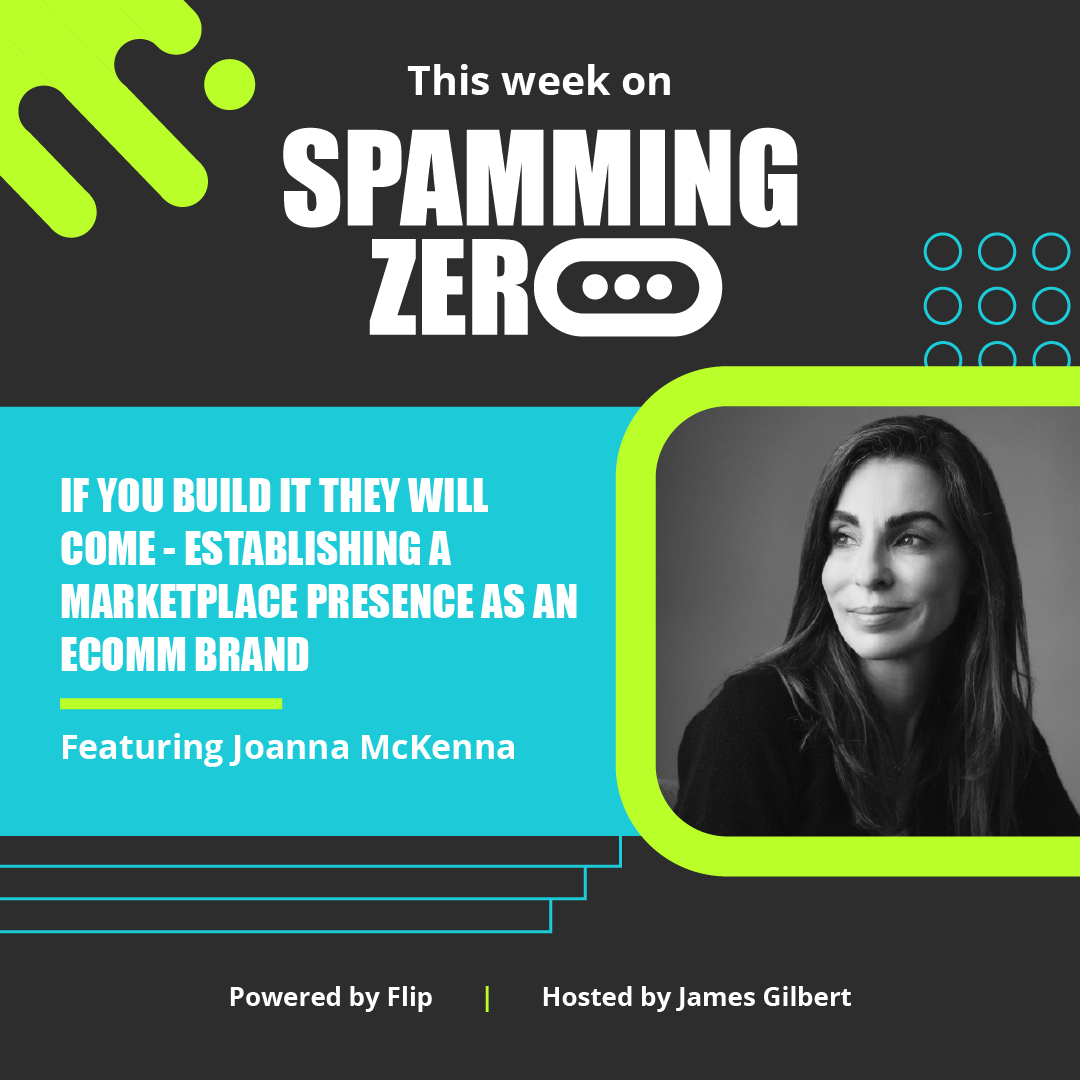Episode 65: Zoovu's Vision - Guiding E-Commerce Choices
- 0.5
- 1
- 1.25
- 1.5
- 1.75
- 2
Lamees Butt: Bosch worked with us because they said, " Look, we know that our customers need help when they're online shopping for our products. We know that they're complex purchases, and what we want to do is help them get to the right product for them."
James Gilbert: I'm James.
Brian: And I'm Brian.
James Gilbert: This is Spamming Zero. September 2023, Spamming Zero sponsor is Tapcart, tapcart. com. Listen to some of the brands that are using them today to make their mobile experience even better, and to increase their revenue and potential with their customers. Princess Polly, True Classic Tees, Pier 1, Fashion Nova, White Fox, Chubbies, Fanjoy. The list goes on and on. So many great customers. We all spend so much time on our mobile devices, so it's no question that you need to be thinking about a mobile first environment and digital experience. Tapcart can provide that for you. Take a look at them, tapcart. com. Right now they have a two week trial that you can try out for free, and on top of that, they are backed by Shopify and many others, so you won't have to worry about that integration point. One of my favorite things about them on their website, on their homepage, if you go to their case studies, they have this little section called" Tailored for your mobile app for your industry." What's beautiful is they don't just look at e- commerce as a whole. They look at this specific niche industries because let's be honest, if you're in beauty and cosmetics, you need a specific app for that. What's up everybody? James Gilbert, your host here for Spamming Zero, back again for another week of fun. We are joined this week by Lamees Butt. Don't mess up her name, all right? She's had enough bullying with it in her life. We don't need more of it. She's the SVP of Global Alliances and Channels at Zoovu, has 10 plus years of experience in digital transformation across brands like Salesforce, big B2B company, if you aren't familiar with them, you should be, Mercedes- Benz UK, and now Zoovu. Welcome to the show.
Lamees Butt: Thanks for having me, James.
James Gilbert: Lamees, I always ask every listener that comes on the show, at least I'm trying to ask these questions a little bit more, trying to be a little bit different. Tell us about a brand that you would get a tattoo of and tell us why you would.
Lamees Butt: God, it's such a good question. I have no tattoos, first and foremost, and have always wanted one. You've now got me thinking deeply about what I would actually want. Recently, I've actually found a new love in my thirties for basketball, and that's because I've been out to the US a lot, and managed to get myself on the Miami Heat court after the second quarter game. Don't know how I managed that, but I now enjoy playing basketball and so I would probably... It's just a staple, the Nike tick, it's nice and simple. You would have it somewhere. I also just love" just do it" tagline too, and that resembles me as well. Just do it. Yeah, probably the Nike logo.
James Gilbert: I like it, and I like the fact you're a basketball fan because I'm a huge basketball fan as well.
Lamees Butt: Huge, yeah. I feel like I'm still an amateur though, so I'm learning the ropes, but the Heat's game was my first ever basketball game, and at my first game to end up on the court was just like, you've got to now love this sport. It was hard to not.
James Gilbert: Well, so you're located in the UK, right?
Lamees Butt: Yes.
James Gilbert: You love football, and not American football. You love the football, right?
Lamees Butt: I am a Manchester United-
James Gilbert: Rugby is really big over there too, from what I understand.
Lamees Butt: It is, it is. I would definitely say I'm not a huge rugby fan. My partner would. He's a huge rugby fan. I'm not. Definitely a big football fan, and Manchester United has definitely been the team since I was a young girl that I've been rooting for. The Reds, the Mancunian accent, it's all about that.
James Gilbert: I know you're probably not a fan of this particular athlete per se, but maybe you are now that you're finding your roots more in the Miami area. What do you think about Messi going to the Miami, major league inaudible?
Lamees Butt: It is hard to give any criticism to Messi. He is, in my view, the greatest player of all time, and I have a lot of respect for the man. I just think that he's humble, he's an incredible player, and he's just got hustle, ever since he was a kid. You look at his story and it's hard to, at this age, look at his decisions and think badly of his choices. He's done right this far, and how can I... Going to Miami, I would go to Miami. The weather's so much better than especially here anyway, so good on him. Enjoy Miami.
James Gilbert: Plus, it's beautiful. The weather's good, but it's just so beautiful.
Lamees Butt: For sure.
James Gilbert: I think it's a little hidden gem out there, but that's for sure. All right, so let's dive into this. I would love for you to give us a little bit of context on Zoovu. Tell us a little bit about them, what you guys do, and what it's about.
Lamees Butt: Totally. Zoovu is an AI discovery platform, and our goal is really to connect your end customers to the products that they need in the fastest way. We integrate agnostically into any e- commerce platform, and really our goal is to supercharge your conversions for D2C brands and B2B brands.
James Gilbert: Love it. You guys don't generate the content, right?
Lamees Butt: No, no, we don't. This is what's also interesting, we don't generate the content, but what we do is we aggregate all of the content from your sources. It could be CMS systems, it could be PIM systems, it could be any form of portals where you store PDFs and things like this that hold the data around your products, and we'll aggregate all of that into our platform. The beauty of what Zoovu does is it transforms it and humanizes it into a structured foundation set that can be used for human- like conversations.
James Gilbert: I kind of want to use that. Do you guys offer it for B2B?
Lamees Butt: Well, actually, funny you say that. Historically, we've been around since, God, 2007. We rebranded in 2017, and we just secured our series C funding last year. But actually historically, B2C was our focus. I'd say 60% of our customer base was B2C. We work with Amazon, Dyson, all of the big ones. Actually, over the last year and a half, we developed a really strong partnership with SAP, who are the market leaders in B2B. What we identified is such a huge space for the B2B market, almost like a revolution that they're about to go through, because you imagine you want to buy, let's just say electrical components. You have to be on the phone to your sales rep for 90 minutes, because they're the only ones that have the knowledge of all of the compatibility rules, all of the configurations. Then, after the 90 minutes call, I'll send you your quote and your invoice. But now with Zoovu, we can actually connect that backend CPQ where all of that configuration is stored, all of the compatibility rules, and we can expose it to the end customer on commerce, and actually guide them through a series of questions to that end configuration. Really focused on the needs, the job to be done.
James Gilbert: Love it. I think that's incredible and I do think that there's a major use case for B2B, for sure.
Lamees Butt: Yeah, huge.
James Gilbert: Today's episode, we're definitely going to be focused on e- commerce and direct to consumer brands, because that's our primary listeners out there, just, so shout out to all of our listeners out there. Love you all. Thank you for following us. Let's talk about e- commerce engagement. How do some of the biggest D2C brands that have worked with you, how do they optimize their engagement? Because oftentimes, e- commerce is thought of as just this big open thing that has so many components to it, but primarily it's meant to drive engagement. Let's talk about how you optimize it.
Lamees Butt: I think I'll start with just the fact that e- commerce today, the way I see it, is an index. It's a library of products and it's no more than that, and I think that people, brands, manufacturers, retailers, some will think, " Well, we've got an e- commerce presence, that's enough." It's not. You need to be really thinking about your customers, number one. Segmenting those customers, two, and really making sure that you understand the personas of each and being able to guide each of them through their specific journey, because we don't all shop in the same way. I don't know, when you go to a website, do you go straight to the search bar, type in what you're looking for? Or do you browse a little bit, navigate around the category pages? Are you a deal hunter and you're straight for the deals? There's different-
James Gilbert: I'm a browser.
Lamees Butt: Oh, you're a browser?
James Gilbert: I browse. Yeah, right.
Lamees Butt: With somebody like you, you are looking to discover, and the thing is, what we want to do is, it needs to be a balance of discovery, but not feeling this paralysis of choice. What we want to do is understand at what point a customer like you has intent to purchase. At that point, it's, okay, there's intent to discover a specific product and purchase something. We want to help this customer navigate them through, at which point we will power a conversation. Then we'll play it out. One of our customers, and I'll do it for customer Bosch, we all know of Bosch power tools. I recently needed to renovate and I don't know which power tool the drill pieces go into brick walls, or they're like MDF walls. I don't know. This is stereotypical.
James Gilbert: Yeah, I know what you mean.
Lamees Butt: I don't know. I would have to go into a store and ask the sales rep and be like, " Okay, look, these are," and I'd probably take pictures, because this is the type of person I am, " Here on my phone, this is the picture of this wall, this is the picture of this wall. Can you help me? I don't want to break anything. Which is the right drill and the piece for it?" We'd have a conversation, and within five minutes you'd walk over to aisle nine, and there it is. Now, there is no way currently of doing that, pre- Zoovu, of doing that on commerce. You would have to go through the pages upon pages of different drills with no real understanding of which is the right one for you,, other than" three millimeter drill". Well, I don't know what that means. Does that mean it's right for the MDF walls or the brick walls? With Zoovu, Bosch worked with us because they said, " Look, we know that our customers need help when they're online shopping for our products. We know that they're complex purchases, and what we want to do is help them get to the right product for them." Here's the sweet spot. Once we get them to the right drill, we don't just help conversion, we can actually boost cart value, because once you've had that trusted conversation and you get to the right product, wouldn't you absolutely purchase the associated compatible products that go with it, rather than having to search for them all yourself or do tons of research to find out which is the right one? You would just buy the entire bundle.
James Gilbert: The recommended suggestion.
Lamees Butt: Exactly. That's exactly what we do. D2C brands really recognize that their customers need support when purchasing on commerce. I think that that's just the baseline. Commerce foundation, basic, basic level. Then you want to be thinking about your composability strategy. How can I use tools, how can I use strategies to help enhance this e- commerce experience for my customer? Lead with customer- centricity. Then, taking it one step further, how do I create this connected customer experience that people talk about? What is a connected customer experience? That's really being able to understand that the brick and mortar stores and commerce, they are connected. As much as we want to separate them, there is a way to harmoniously work together to ensure that ultimately, the brand succeeds at the end.
James Gilbert: This brings up a thought of mine, and I wasn't planning on asking you about this, but now I'm curious. There are these new Tools. I think of ShopAI, Shopify's new shopping assistant thing. I think of augmented reality. I think of virtual reality, and the experience that you have going into a store and trying to find... To your point, taking pictures of the walls and which ones work for what. I'm curious on your perspective on what the future of that looks like. I personally believe that you're going to see more of those experiences.
Lamees Butt: 100%.
James Gilbert: Especially with complex products that require a lot more intervention in them, a lot more visual representation on, will this work with this product? I think we're going to see more of that, but I'd love to hear your thoughts on what does the future of that look like? Do you think that there is a place for VR and AR, and do you think brands, especially D2C brands, need to be investing in those areas more?
Lamees Butt: Well, I can give you two examples. I won't give you War and Peace, but I'll keep it succinct. Laptops. Now, even though I work in tech and I've worked in tech, digital transformation, for over 10 years, you'd think by now I should know what RAM or how much RAM I would need for my laptop, or how much CPU I would need. I don't. I just, I don't. It's probably a choice, that I choose not to know these things, but even now when I need to buy a new laptop online, I still feel overwhelmed by the choices that exist, from HP, to Lenovo, to Dell to Microsoft, to all of the different brands that exist, which is the right one for me? Microsoft, one of our customers, again, understood that problem, and they now create an incredible experience for their customers where we actually ask the right questions. Am I using this for personal, school, or work? What do I like to do with the laptop? I like to blog. I like to sort everything on my laptop because a weirdo, and I travel a lot. With those real human needs, you can direct me to the right laptop for me. But guess what? Even when you're showing me that laptop there on the page, I need to feel it. I want to make sure that I can carry it. I'm a small girl, and I want to make sure when I'm traveling that it really is as light as you say it is. I'm just one of those customers that perhaps needs a little bit more to make me convert. The incredible thing that Microsoft did is create the connected customer experience, by generating a QR code at the end of that experience, so that the user could then identify the closest store in their area that had it in stocks that you could go, feel it out, play with it, hold it, and then purchase. I think that to your point of experiences, whether they are just pure experience stores, or whether they're a bit of a blend of both, where you can have the early funnel, upper funnel happening on commerce, and they drive you to the store, I think there is so much room for both, and it's going to be huge coming into 2024 and'25, where I feel like the brands are starting to pick up on, " Let's just take away this boring element of the store, and let's turn it into an experience." Dyson do it incredibly well. They're also the reason I now have an Airwrap, because quite honestly, I wouldn't have bought that Airwrap just online. I really had to feel it online. I was looking at it for a little while, really understanding that it was the right one for me, and then went in store, played it out, tried it on my hair, and I purchased.
James Gilbert: I love what you just said. I think you're spot on, and I think that we're going to see way more of it in the future. I do, however, want to point out one thing that you said, which I also completely agree with, and that's the hybrid experience, which I think the more that AI gets introduced to the world, the more that we're going to crave more human experience too. I think that's natural in this evolution. Obviously we need AI, and we're going to dive into that in a little bit, but the hybrid experience of just being able to feel something in your hands. Same thing goes for clothing as well. You have these virtual size charts and things like that now, where you can literally take a picture of your body and it will fit on there, but it's not the same virtually. We have to realize that, as brands that have these type of products. There will always be a crave for the physical side of things, where we actually go in and we experience it ourselves in person, so I love the fact that you pointed that out.
Lamees Butt: I think also, just to piggyback off that, was that for D2C, I think it's a huge opportunity. I think for B2B, one of the things that I love about what Zoovu does is that, imagine trying to procure a fireman's helmet. They're not the easiest things to purchase. Also again, they have lots of compatibilities, lots of compliance rules associated with, what type of smoke might I be going into? Is it gas? Whatever it is, they're saving lives, so we need to be making sure that that they're getting the right configuration. A lot of what we now want to be able to do in service, the people who are procuring these items is actually the visual representation. With our visual configurators, you can actually now do 3D, turning around and that augmented visual to be able to really see how the product will work, how the mask will flip down, how that connects to the oxygen in the back. I think it's just really powerful also, to the next generation of people that are going to come in to take those seats, because I think it's a really an area that people are, I guess, not wanting to think about at the moment, which is the next generation of workers are going to come in expecting a whole new way of working, and a whole new way of being able to sell, or do their job. They're not going to have the 12 plus years of experience that these guys have had sitting in that seat for however long. We've got to ensure that we're future proofing these businesses, and ensuring that they're set up for success for the next 10 to 15 years. The only way we're going to do that is digitizing their sales process to ensure that when these companies are being asked to do more with less, we still need profits. We still need however much target we need this year, but you can't hire more salespeople. Well, how are we supposed to do that? That's where Zoovu comes in.
James Gilbert: Yeah, I think being in B2B for as long as I have been, the sales process is still fundamentally broken there. Almost every company makes it incredibly hard to buy. They put up friction points on purpose, by the way. It's wild to me. I want to come back to the original question that I asked you about engagement, because I want to ask a follow up there. One of the follow- ups that I have for you is, what challenges are people running into by creating high engagement platforms and high engagement e- commerce, and what would you say to them to try to prevent them from having those challenges?
Lamees Butt: I think that the challenge is, it comes with the concept of being agile. In the world that we live in today, I think we all love to say that we are part of the digital transformation, that we're all engaging in some form of digital transformation. But that's not a destination, it's a journey, and it's ongoing. We consult with our customers, we treat them as partners, because this is a journey that we're going on together. For example, you don't just purchase Zoovu, and you get the license, and off you go. We want to work together to test and learn, to make sure that we're constantly optimizing that experience for your customers, because that's what it's about at the end of the day. I think that a lot of organizations who do want to truly engage, who say that they're innovative and also action on it, are the ones that will put resources behind making this successful and then continuously learning and continuously saying, " How can we be doing this better? Let's work together, let's workshop this out. We recognized over the last eight weeks in the analytics and the insights of the behavior of these digital conversations that they weren't working so well." The beauty of what Zoovu can do, I won't jump to AI, but with our AI that's applied in our platform, we will recommend how to change those digital conversations that will optimize them for a conversion. People ask, " Oh, another AI solution. How does AI really work in your platform?" I don't know if they're expecting me to pull out iRobot, I don't know what they're hoping for, but really my advice to anybody that is thinking about working with a company that says they are AI is, ask about how the AI is applied in that technology or solution. If they can't give you an answer, you know. We weave our AI and apply it throughout the end- to- end journey. Like I said, one of the most powerful things that we do is be able to highlight, target, and identify when conversations aren't performing, and recommend a conversation that would perform based on the data and the aggregated knowledge that we've had for how many people have gone through that same experience.
James Gilbert: I can't agree more than asking that question, by the way, to vendors, because it is driving me wild. Especially with this AI revolution, if you really work at an AI company like we both do, it's driving all of us nuts that every company in the world is saying, " Oh yeah, we do AI. We're an AI company." No, that's not true. There's components of your product and service that you might be using bits and pieces of AI. I had this big argument with some of the biggest B2B tech minds in the world, actually, like the CEO of HubSpot and the CEO of Gainsight. They were all jumping on this bandwagon of, every company is going to be an AI company. I'm like, " No, I'm sorry, but that is just not true." Every company will have components of AI and they will use it, and I will stand on this hill, and I will stand firm on it, because the fact is, if you're developing your products and you're leveraging AI, you didn't start as an AI company. You're becoming where you're leveraging it more. I think more people will use it. Again, we're going to dive into AI some more. Actually maybe we'll just do that right now. Let's just do it right now. Why the heck not?
Lamees Butt: It makes sense. Yeah, why not?
James Gilbert: Talk to me a little bit about the impact of AI that you think is going to have on e- commerce and direct to consumer brands, now and in the future.
Lamees Butt: I think that, first and foremost, it's an incredibly exciting time. I think there's a lot of fear out there around, " Oh God, what is generative AI? What is ChatGPT going to do? We're all going to lose our jobs and robots are going to take over." I just don't believe that that is true. I think that the people that are understanding how to use AI and apply it to their companies are the ones that are going to succeed, because I think AI plus human is the recipe for success. I think in 10 years time, if you're not using AI as part or some of the parts in your technology, in your business, I think that you will unfortunately fall behind and fail. I think it's about making sure that you're using the right parts of AI in your business, in your platform, whether it's to automate things, augment things. There's great use cases for it, but it's really about understanding that the human intelligence side isn't going away, and AI is only going to get better through human intelligence. It's about reframing how we think about it. Yes, some jobs probably will change, but I don't think that's a negative thing. I actually think it's a good thing. Jury's out still. From my perspective, I think that we're still in the infancy of it. AI has been around for a long time, but I do think that it would be foolish to put all of the eggs in the basket now of AI in the sense of recommendations as it pertains to products or services that impact life, or that impact things where there's high compliance in play. The reason I say this is, I see especially chatCPT generative AI in this way. When you hire a new salesperson, they're an intern, practically. They have to go through onboarding. Rigorous, rigorous, it might be a six week bootcamp, and even then after that point, they might just be a sales associate, but it's going to take them years of qualification to get to manager level, or the expert level, or the SME of that specific area. That is what we're currently doing by engaging with AI and engaging with ChatGPT and generative AI. We're helping it learn by giving it the information that we have. We're asking the questions for it to learn to keep learning. I'm excited to see where it goes. I think it's incredible. To answer your question, I think that there is a huge future for AI as it pertains to tech and business. I think that we just need to figure out how we frame our thoughts around it, because jobs will change, but I don't think that that's a negative thing.
James Gilbert: Yeah, I agree. Just for the record, if you really think about it... As a matter of fact, I'll give you an example. The other day I was talking to a gentleman who was, he's 85 years old, and I was talking to him about AI, and he had some really great thoughts on it. I was surprised, because typically I think that older generation is a little bit less inclined to adopt it. He had a different perspective. He said it like this, and I'm going to summarize because I'm not going to get it perfect, but he's like, " We've gone through revolutions with many things in the past, and if you think about it," he started by saying, " Think about the invention of the automobile. Everybody changed the way that they worked. Jobs changed, and then the industrial revolution, how we now trade goods changed, jobs changed." Then he went through and said, " Well, then the internet, the dot com revolution. You don't think that changed jobs? Well, I got news for you. It definitely did. Now, salespeople no longer have the Rolodex that they write on. Now, they actually are in the software like Salesforce and things like that." Jobs change, and by the way, through each one of these revolutions, absolutely jobs also went away, but it's the evolution of our intelligence. It's the evolution of who we are as humans. We always find a way to have room for people. Ultimately, even some technology that has come out in the past, probably technology that's going to come out in the future, is oftentimes going to fail if we don't involve the human, and guess what's going to happen? We're going to have to come back to the human side and reinvent it. There'll be another revolution that will happen, and who knows what that will be in the future, but I guarantee you that this is not the first time that, no matter how old or young you are, I promise you you've at least seen two of these revolutions.
Lamees Butt: For sure. Who is this guy? You should be getting him on your podcast. He sounds like his voice needs to be heard.
James Gilbert: He's a neighbor of mine, so I don't know. I don't know if he'd be up for it, but I thought it was words of wisdom from somebody who's been there with tons of stuff. Okay, so we've hit on AI. We've hit on some of the challenges that people have. We've hit on engagement. I actually want to also talk about manufacturers, because I think this is something that we don't talk enough about in e- commerce. There's oftentimes an associated large cost. It's almost considered a little bit of a cost center working with manufacturers. I'd like for you to talk about how can brands reduce the overhead and really, the customer service costs that go along with working with manufacturers.
Lamees Butt: I think what's going to be important is, and I love the fact that you're asking the question, because it's something that a lot of people skim over, especially as it pertains to product information, because product information and the different sources of this cause unparalleled amounts of manual work. That equates to millions of dollars spent per year, trying to keep all of these different systems in line up to date, and then, that's one brand. If you work with a manufacturer, and let's just say we're working with lots of different brands, how do we ensure that we're creating some form of unified source of data or unified way of communicating around the same thing? With Zoovu, it's something that we do, which is, it's called our Semantic Studio within our platform. It's really where we take all of these different sources, and we can be taking it from multiple different brands, and the purpose of it is to say, we know that all of these different brands call, let's just say, and I take it back to the whole laptop example, they might be calling RAM something different in different brands. They might be titling it something different, but how can I aggregate all of that data and be able to use it for something meaningful if I don't know how to collect it from all of the different brands? Zoovu, through our context in Semantic Studio, will be able to aggregate it, highlight all of the different variants of the same thing, and then unify it, so that we can actually use it for a more intelligent conversation. I think that being able to use technologies that can help drive cost efficiencies as it pertains to productivity, is only going to help you in the years where we're now going to have to start thinking about future proofing. Future proofing is such a buzzword, I feel like now, but it really is, how am I going to take this organization through the next five to 10 years and think about this digitization in the era of AI? How are we going to ensure that this company is still around? You've got to make sure that you're thinking about the different areas where you've got manual costs in play. Can those be augmented? Is there automation that we can be doing? It's not to say that we want to completely get rid of jobs, or put people out of jobs, but it's, how can we use those humans to be doing things that drive more efficiencies? I can tell you that there absolutely is. If I could tell you that a team of 50 salespeople, I could be streaming off, let's just say it's 90 hours. 90 hours per month to let them focus more on building the relationship rather than building quotes, because they're now not having to use their brain to pull out all of the different configurations, but they're actually working on the relationship. There you go, upsells in play, expanding those accounts are in play. Those are the types of things that people need to be thinking about. How can I focus my time on efficiencies and driving productivity?
James Gilbert: I love what you just said, because I don't really love to talk about Flip too much on the show, because that's not what we're here for, but we've been going on this journey the last 12 months really, where we've been talking a lot about this, what you just said, and how our products and other products help really do that, which they position agents, they position people that are on the front line to be much more relationship- driven, and to handle the more complex issues that automations and AIs can't handle. I think we're seeing a slight shift happen, especially for us right now. We're seeing this, and this is part of some of the innovation that's happened, I think with AI, is now companies, ones like us are positioned in such a way that we're actually helping them grow as well, grow as an organization, build an acquisition model that's deeper than ever before, and have these touch points that create engagements to the beginning of the podcast like we were talking about. One of the things that I really love is just the evolution of that, and the innovation that's happening there, because it is absolutely true that you... One thing that drives me nuts, just piggybacking on this manufacturing situation, this happens a lot on Amazon, by the way. You buy a product. You think you're going to get the support of Amazon and their agents, so you reach out and then they redirect you to the manufacturer. Oh my goodness, it drives me bonkers. I cannot stand it, because oftentimes the rules that you think you're getting in the descriptions and stuff like that that Amazon is providing are completely different than what the manufacturer is saying that they can do and provide. Even return policies, cancellations, all those things are oftentimes very different. This is an example of how making sure that companies that can provide an acquisition model, that can provide ways in which you can automate and streamline, make them more efficient so the agents and sales folks can focus on the things that really do matter, which is building the relationship. I just did a LinkedIn post today, and one of the ideas behind it was, we oftentimes think about customer experience as all these really complex things, but really it comes down to one thing, and that's that your job is to create emotion and positive emotion. If you can create positive emotion in any way, then it has a positive ripple effect across every component of the customer experience that you can imagine.
Lamees Butt: For sure.
James Gilbert: We overcomplicate it, and we don't need to. It's the simple things that oftentimes make the biggest impact.
Lamees Butt: I could not agree with you more. People buy from people, and we all need to be storytellers, and if you're not storytelling, you're missing a trick.
James Gilbert: I agree. All right, now we're to some of our listeners'. Favorite segment, which is FMK. All right, here we go. You ready?
Lamees Butt: I'm ready.
James Gilbert: All right. What's something sexy right now in e- commerce?
Lamees Butt: Zoovu.
James Gilbert: I like it. All right. What's been around a long time and it's not going anywhere? You had a ring on it and it's staying there.
Lamees Butt: E- commerce. We are here for the long haul. We're going on the journey. E- commerce platform is the foundation, it's the house. Let's just make sure we've got good brick and foundation.
James Gilbert: All right, I like it. What would you kill yesterday?
Lamees Butt: Anyone that is asking me to put in my details to purchase something online, get rid of it. I need fast payments. If there is no fast payment, I'm gone. I need speed.
James Gilbert: I have never heard anybody say that one. That's a good one. Mine stays the same. I just want a streamlined experience, and for people to provide channels when I'm not working. Provide availability when I'm not working, that's what I want to see killed. I don't know why, but the very premise of brands doing that goes against everything that you think you stand for by saying you put the customer first. I'll give you an example. Most of us work a 9: 00 to 5: 00, and if you're an executive like myself, you're probably working way longer than that. I reach out to you in a channel, and you hit me up and say, " We'll get back to you in 24 hours." You get back to me when I'm working, and expect me to respond when I'm working. But then you don't provide a channel when I'm not working to reach you because now you're not open. I think it's the most fundamental thing that is broken with customer service across, by the way, all channels. It is not channel agnostic. It is across all channels. If you're listening, just maybe, just maybe, provide options for people when they're actually not working. If you don't know how to do that, just try asking some of the vendors you work with. I can guarantee you if you do that, there's more solutions out there than you might think. They're not really complicated solutions. That's my big kill.
Lamees Butt: I could not agree with you more, because that concept of sitting and listening to that music, whenever I'm on hold for something, in literally the 10 minutes that I've got spare, it's the biggest bugbear, because I know I'm not going to get the call answered, so when are you expecting me to communicate with you? When are you as the brand hoping to build that relationship with me? Because you are not going to get my repeat custom. But however, if you did answer that call and we had a great relationship, you could put money on the fact that I'd be purchasing from you the next time. You make such a good point, and I think from a customer retention standpoint, support and customer support is pivotal.
James Gilbert: By the way, let's use you and I's time zones for an example. You have a brand, and that brand has contact center operations and their hours are, let's say 9: 00 to 7:00 Eastern time. You do realize the time difference that's happening across the world, and if you have customers across the world, which by the way, most brands really only have a US operation timeline, which means the rest of the world is not getting served, not even near as much. Just that alone should be enough for you to invest in those areas anyway. This was not my kill. This was supposed to be yours.
Lamees Butt: No, but I also think that to that point, there's almost a level one, level two, level three solution. For companies that are thinking about, " Oh, how can I use AI?", or, " How can I apply AI so that I can say that it's weaved in some way?", support is probably the best way to even start looking at a level one way to augment those things. Because if you can triage some of your customers into the easy solutions that you know are available through FAQs or whatever it is, do that. Then you have your level two support, where you're probably going to need human interaction, and level three is the top 10% where you are going to really need a long conversation of probably big action required or whatever, but you should be thinking about support in that way. As you say, there's definitely ways to segment that, and at least get quick wins in for customers that just want to feel heard and seen.
James Gilbert: I agree. By the way, I don't want to say no one's doing this, because there are people that are doing this. They provide the chatbots, they provide the voice AI, after hours. Those things for self- serve options are fantastic. To your point, there are levels of the service that then need to be provided for those where that can't be. Anyway, Lamees, you've been awesome. Thank you for joining the show. Where can people connect with you?
Lamees Butt: Yeah, find me on LinkedIn. I'm super, super active over there, so my full name, Lamees Butt, or hit us up at zoovu. com.
James Gilbert: Awesome. Thank you so much for joining us. If you have not yet subscribed to the podcast, do so. Every single week, we have awesome shows just like this. Sometimes we do a little bit longer segment, sometimes we do a shorter one, but you'll always find value, no matter what. Thanks for joining us, Spamming Zero.
DESCRIPTION
Gotta’ say - we’re pretty lucky to get to chat with some of the most brilliant folks from around the globe here on Spamming Zero.
This week, that’s Lamees Butt - SVP of Global Alliances and Channels at Zoovu. She brings some fresh perspective on the keys to success in E-Comm, and we’re super excited to share it with you.
What’s Covered?
- The Power of Connected Customer Experiences
- E-Commerce Evolution: Beyond B2C
- AI’s Role in Enhancing Customer Centricity
- The Challenge of Online Product Selection
- The Central Role of Emotion in Customer Experience
- Evolution of AI in Business
- The Hybrid Shopping Experience
- And more
Ready for more fantastic Spamming Zero conversations ahead? Listen, rate, and subscribe on YouTube, Casted, Apple Podcast, or Google podcasts.
Today's Host
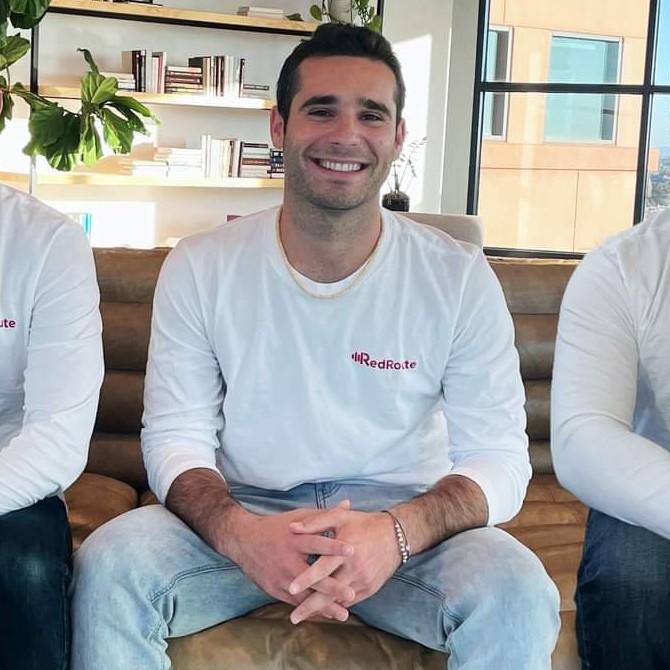
Brian Schiff
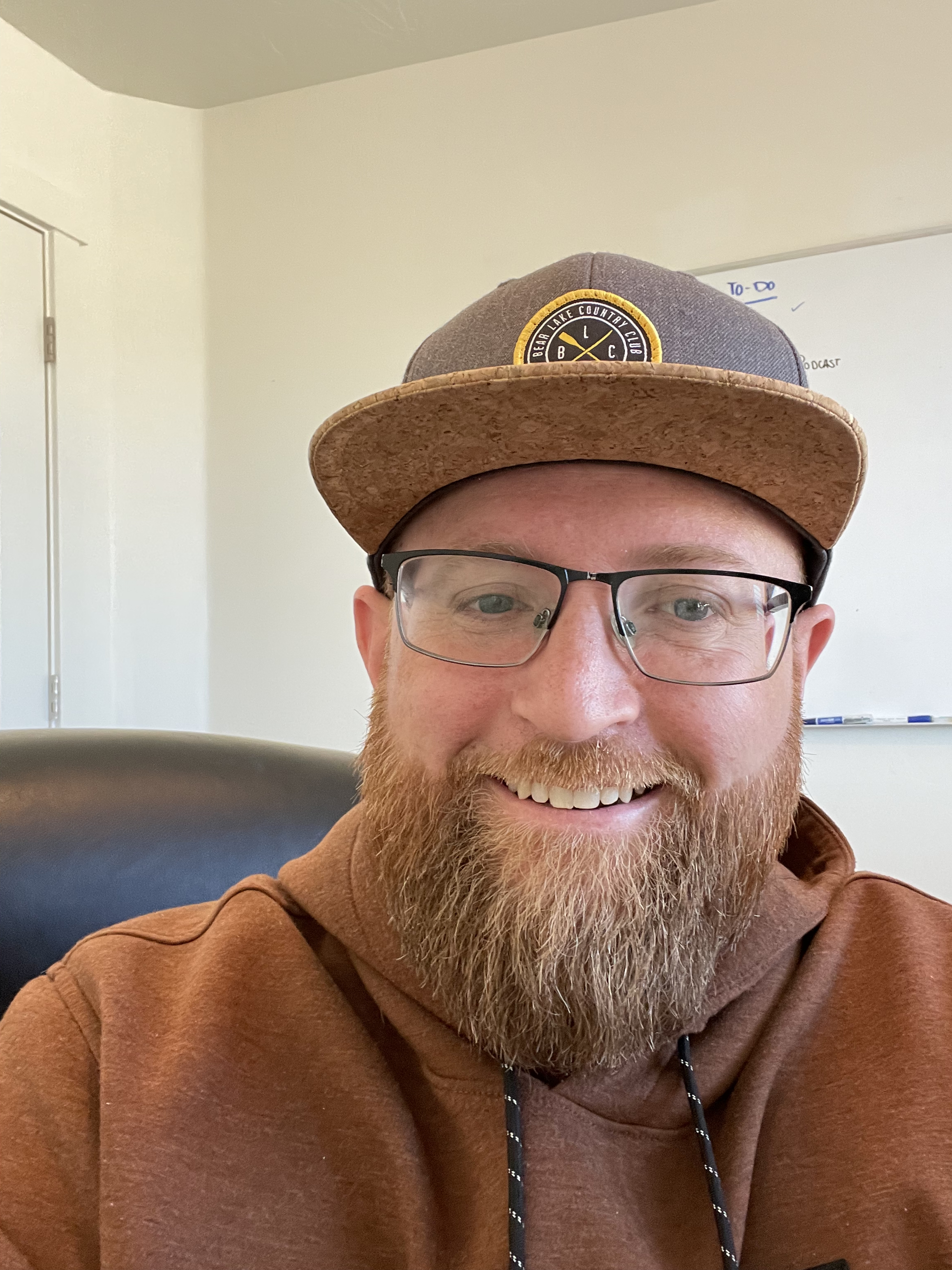
James Gilbert
Today's Guests

